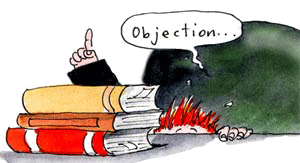The subjects they choose ... Divining the character and culture of law students ... What becomes of them? ... Corporations and tax ... Labour law ... Sports law ... Antonin Scalia law ... Human rights .. Equity ... Philosophy ... The different choices are defining ... Barely Legal reports
 From first to third years, law students hide themselves in the anonymity of giant tort and contracts lectures. But all good things must come to an end, and with the final two years of law school comes the opportunity to show their true colours through elective selection.
From first to third years, law students hide themselves in the anonymity of giant tort and contracts lectures. But all good things must come to an end, and with the final two years of law school comes the opportunity to show their true colours through elective selection.
Through careful study of these classes, we can parse the subtle (and less-than-subtle) differences between different student cultures.
Corporate and tax law electives (which make up a hefty bulk of the electives on offer at Sydney, unsurprisingly) are a haven for the Comm/Law grad. Peering over shoulders and at the screens of those in attendance provides a masterclass in how to build (and lose) a small fortune through crypto trading before the age of 24.
Learning about the world of high finance, "tax minimisation" and corporate power could provide deep insights into where power really lies in Australia and how our economy works. Unfortunately, the only goal for these students is to extract a profit from that system. I imagine they will be quite successful.
At the other end of the spectrum, labour law classes are filled with the law school's small bleeding-heart faction. Specifically: sweet but incompetent Labor Left hacks; cruel and incompetent Labor Right shills; puritanical Marxists; and students with real jobs in hospitality (who have spent the last few years risking COVID to ensure the former groups can enjoy almond milk lattes).
Regardless, as the lecturer dolefully noted in the course's first class, most will go on to represent employers against their workers.
Sports law forces two distinctive tribes into the same classroom. There are bookish honours students, keen to take a "WAM boosting course" as a leg up into a first-class honours.
And the second, are students from the elite athlete program - who can receive admission into competitive law courses with an ATAR 5 points lower than the required minimum.
Unsurprisingly, there is little studied interaction between the two.
Under the banner of a "US Constitutional Law" class, the law school convenes bi-weekly meetings of the Justice Scalia fan club. Here, law students are (as ever) keen to cast off aspersions that young people are more progressive than previous generations.
The attire of choice is chinos, button ups in Young Lib Blue, RM Williams and the lanyard from their corporate firm.
They are keen not to let discussion of caselaw, or the lecturer, interrupt their praise for states' rights, small government and originalism. It seems like a missed opportunity that the law school doesn't have a permanent exchange program with US colleges.
Human rights law students have spent the last few years preparing for the course in Model UN. On last count, Amal Clooney posters adorned the walls of 92 percent of attendants.
Their deep knowledge of global politics, built on their experience of impersonating an Azerbaijani UN rep when they were 18, is used to continually remind their lecturer that actually "the issue is much more complicated".
While they are (of course) human rights supporters, they're keen to play devil's advocate. That will stand them in good stead. Despite their dreams of being a celebrity human rights lawyer, à la Ms Clooney, they're more likely to spend the next few years drafting Australia's responses to the UNHCR denying human rights abuses on our numerous island prisons.
Brave students who venture into the difficult advanced equity electives are the crème de la crème of young legal minds, or (at least) think themselves to be. Overheard in one class, a student professed that he strongly identified with a young Dyson Heydon: "I think he'd see a lot of himself in me."
All law students must take at least one philosophy course with the law school. While serious philosophical study will be new to most, that doesn't stop the vocal minority from concluding that they have the answers to millennia-old questions about justice, rights and law. One could guess that study of the works of great minds might humble law students, but these classes show that really nothing will.
Hart is clearly wrong, they declare; Mill, a fool who failed to consider the obvious; Raz, just an idiot. If only these illustrious thinkers had the chance to run their ideas past a group of LLB Vs before publication, then they might have stood a chance.